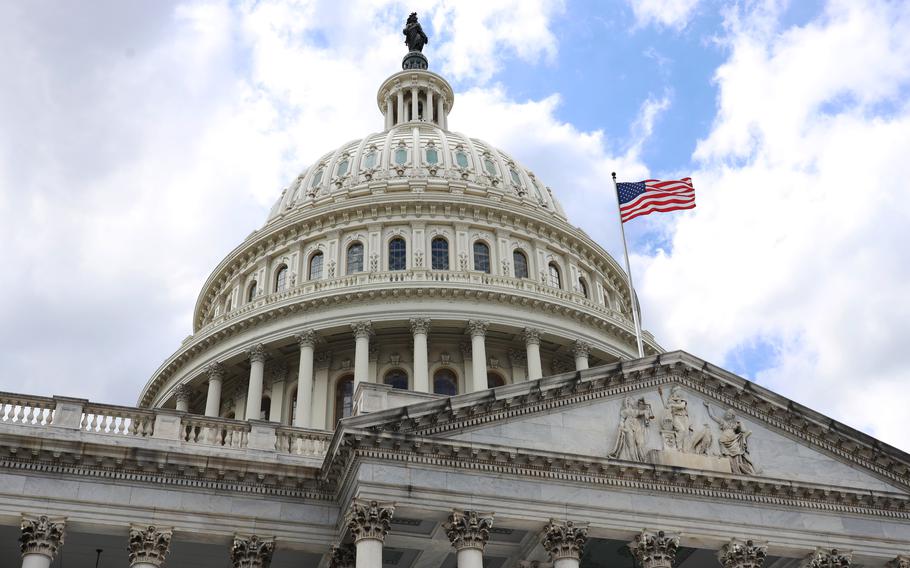
The American flag flies over the Capitol in April 2022. (Desmond Andrews/U.S. Marine Corps)
Two hundred fifty years ago this month, on Feb. 9, 1775, the British Parliament declared the Massachusetts Bay Colony to be in “rebellion.” This allowed British soldiers to shoot suspected rebels on sight, which encouraged further rebellion and the growing independence movement. The shooting war began two months later when fighting broke out at Concord and Lexington.
Seventy years ago, in 1955, Warner Brothers released the film “Rebel Without a Cause,” starring James Dean, Natalie Wood and Sal Mineo. The film — set in the world of teenage gangs, stolen cars and knife fights — revolves around Dean, playing a troubled 17-year-old “struggling to live with integrity” in a world of moral chaos, in the words of the late film critic Jay Carr.
The film was a huge success in the United States but censored in Great Britain and banned in New Zealand and Spain, where authorities worried that it would destroy the morals and habits of young people, alienating them from society.
The notion of the “alienated teenager,” causing trouble for trouble’s sake was somewhat novel when Dean and Wood appeared on the screen.
Until the 1940s, there was no special focus on young people between the ages of 13 and 19 because most teenagers would either leave school (with or without a diploma) and start working or engage in rigorous preparation for college. No one had the time or energy to rebel, and the word “teenager” had only recently become a marketing category.
In fact, attending high school in the first part of the 20th century was unusual; most young people finished eighth grade and then went to work. However, after World War II, with the widespread adoption of mandatory high school, Dean’s and Wood’s generation was forced to sit in classrooms, wishing they were elsewhere. Many responded to boredom with rebellion. Students without a purpose became rebels without a cause.
Contrast this with the American Founders. In 1775, many of America’s future Founding Fathers were hardly more than teenagers. John Marshall, who would later become chief justice of the United States, was 20; Alexander Hamilton, the first U.S. treasury secretary, 21; and James Madison, the “Father of the Constitution,” was a mere 25. In their teenage years, they learned how to defy an empire. They were leaders in a rebellion grounded not in ennui but in principles.
Eighteen months after being called out as rebels, American colonists declared their independence, claiming that the purpose of government was to protect the rights, that the government derived its “just powers” from the consent of the governed, and when that consent was withdrawn, the people could form a new government. The rights they were fighting over began with “life, liberty, and the pursuit of happiness.” The American rebels clearly had a cause.
The right to pursue happiness is a core American principle. It informs our special kind of individualism and our big heart and explains why we generously give people second chances, have among the world’s most lenient bankruptcy laws, and are far more tolerant in many ways than most other countries. We want people to live free and fruitful lives despite their past mistakes. We encourage people to dust themselves off and try again.
Americans also understand and even tolerate when a few rules are broken in the pursuit of their happiness. In many countries, speeding is monitored by remote cameras. In the United States, only a few states allow them, and they are often controversial.
If the juvenile delinquents in “Rebel Without a Cause” had rebelled in the name of some principle, they probably would have been understood (and the film much less successful). The problem is the senselessness of their rebellion, which, if anything, was contributing to their unhappiness.
By contrast, the American rebels of 1775-1776 aimed to restore essential liberties that they believed were a God-given birthright.
They were rebelling against the authority of Parliament to govern them without representation, demanding instead the right to self-government. They sought to be treated as adults and the United States to be treated as a grown-up nation.
Frederic J. Fransen is president of Huntington (W.Va.) Junior College and CEO of Certell Inc. He wrote this for InsideSources.com.